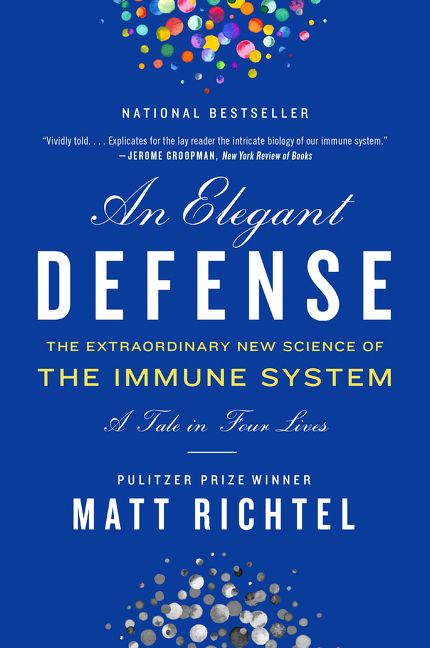

She thought eating healthy, getting rest were extremely important. Richtel’s father ran marathons and favored trail mix, he says, and “I had a mom who was an insanely early adopter of what is now seen as a very thoughtful approach to health. Recalling childhood years in Boulder, Colorado, he finds possible origins for his interest in the immune system and wellness. “Whether I write a song or prose, I’m trying to have the language be consistent with the story, engaging to the audience, but reflective of the core emotion I’m trying to communicate.”

Self-described as “scrappy and fiercely joyful” in his nonwriting pursuits - tennis, singing, espresso-drinking and activities with his wife, Stanford neurologist Meredith Barad, and their two children - Richtel finds his greatest bliss in words well chosen, spartan language that avoids clichés and celebrates storytelling. It’s not accidental that Richtel, a guitar player and songwriter, mentions music. Richtel’s book includes the personal accounts of two women who suffer hard-to-diagnose autoimmune diseases, a miracle HIV survivor and Jason Greenstein, a close friend of Richtel’s whose episodic battle with cancer entails both a celebratory “festival of life” and a grim foreshadowing of inevitable mortality.

When I read a book that’s dryly factual, one that feels more like white paper than story, I cannot engage with it.” Despite the topic’s staggering complexity and the extensive information in Richtel’s fact-filled coverage, the heart and fine craft of a storyteller emerges most memorably throughout the book. It describes the wide umbrella of the immune system’s astonishing domain: HIV, diabetes, asthma, colitis, rheumatoid arthritis, lupus, cancer, infections, fever, overprescribed antibiotics, T cells, macrophages, neutrophils and other vital components. Subtitled “A Tale in Four Lives,” “Elegant Defense” examines the immune system’s history and future through the lens of science, records and research and the case histories of four individuals. He is a reporter at The New York Times, the creator and former writer of the daily comic strip “Rudy Park” and has appeared on NPR and PBS NewsHour. The San Francisco-based Richtel has written several thrillers, but his first nonfiction outing, 2014’s “A Deadly Wandering,” about distracted-driving, combined compelling human narratives with in-depth science writing. It’s one of the paradoxes that fascinates Pulitzer Prize-winning journalist Matt Richtel in his new book, “An Elegant Defense: The Extraordinary New Science of The Immune System” (William Morrow, $28.99, 409 pages). New York Times reporter Matt Richtel has written a lot of fiction, but he says he also loves nonfiction “when it has momentum.” SIMONA DEAC/PHOTO The biological system charged with preserving human life, diversity and reproduction is also the instrument which will kill the majority of us.


 0 kommentar(er)
0 kommentar(er)
